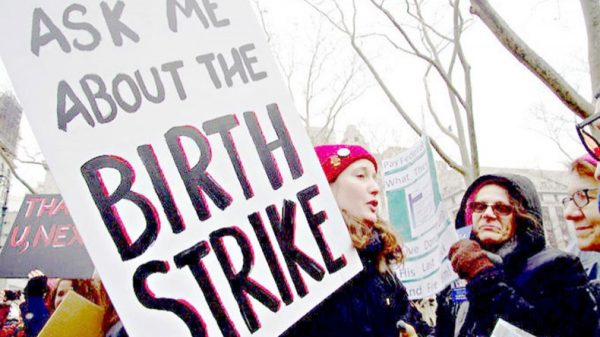Sporadic notes: BirthStrike

SCIENTISTS to some people are bad. The cause: scientists present horrifying facts about climate.
To many others, scientists are good people, doing incredible work, helping humanity. With the latest findings on climate crisis, scientists are making the world aware: get rid of the system creating the crisis.
Climate crisis is hurting all in the global south and the north. Parts in the global north, to some extent, will pay more than parts in the south.
It is impossible to find a single person who does not love offspring. This love makes many parents, would-be-parents and prospective-parents concerned with this planet going to be a devastating place.
Climate crisis is doing the ruining job — a scene-inferno. The ominous rates are quickening — sometimes, faster than scientists calculated. Today, all know these scary facts.
This makes many people question: what is waiting for our daughters and sons in the world they will be living? How much will they suffer? Eco-anxiety is occupying discussions at an increasing rate.
Children are heavenly. Seeing them suffer is hellishly painful. Even, imagination of their suffering is a nightmare.
Hence, groups of people are pondering whether to bring a child on the world with a collapsing ecosystem that makes life unbearable.
In the United Kingdom, BirthStrike, with its more than 330 members, has voluntarily made a resolve — the members shall not have any children as long as political will to harness climate crisis continues to languish.
Blythe Pepino, a musician from the United Kingdom, was yearning to be a mother. But her motherhood dream faded away as she came across a 2018 UN report that warned: we have just 12 years to act to resist climate crisis.
Pepino organised the BirthStrike. A Huffington Post report, ‘Women are sharing the devastating reason they’re deciding not to have children’, carries details.
The July 1, 2019 report by Laura Paddison says: Pepino put her concerns on Facebook, and 50 persons expressed the same concern. They signed the declaration. BirthStrike was formed in 2018. Their aim: spread the message about crumbling ecology, wake people up, get together.
It is a form of protest. Many people differ with the BirthStrike that aims to organise a support network and a movement. To the people in disagreement, it is the surrendering of rights to a system devastating our planet.
How much it matters with whether it is a protest or not? How much it matters whether it is justified or not? It is a painful expression of a group of mothers’ dream: a happy, peaceful life for our daughters and sons.
There is Conceivable Future. Its co-founders Meghan Kallman, a sociologist and city councillor, and Josephine Ferorelli, a writer, illustrator and yoga instructor, were concerned with climate crisis and having children.
The CF’s effort: inject some humanity into the debate on climate crisis.
The CF brings people without children, expecting parents or parents having children together to talk about the crisis through the lens of their parenthood hopes and fears.
The organisation tries to send message: ‘…a dark situation we’re in.’
To Kallman, social movements turn successful when people understand its meaning for their own lives.
They film parents’ feelings — ‘testimonies’. Mei’s is one of the most recent.
Mei, a Chicago resident, turned anxious: The world she would be leaving to a potential child. She had long debates with her husband. Finally, they decided to go for it. Mei is expecting her first baby in August. But she remains deeply worried.
Other testimonies are of the agony of indecision. Meghan Hoskins from New Hampshire very much wants kids. But she is ‘afraid that they will eventually have to live in a world where there is no fresh water and that is increasingly full of dangerous and toxic chemicals.’
None of these organisations is population control movement.
Londoner Lucie Brown, mother of two and a climate activist, says being a parent inspires her activism. ‘Maybe having children and experiencing that grief and fear for the future’, she told Huffington Post, has motivated her ‘to find the power… to say actually we can — and we have to — change the systems that we’re living within.’
She said: ‘I don’t know in this moment [whether] I would have children if I was currently without children.’
Jessica Garrett, a science educator from Somerville, Massachusetts, said, ‘How could I dot my first job as a parent: keep him safe and healthy?’
She said: ‘We could share our fears and grief and hopes for our children. And then we go out together and speak up.’
If she were deciding now, she said, she might not have had any children.
The system is destructing motherhood. Mothers fear the future — a burning earth.
Yet, the system is operating.
However, hopes should not be lost.
Despite mothers’ fear, Laura concludes: ‘I would still have children again…. there is hope in humanity. There has to be.’























Leave a Reply